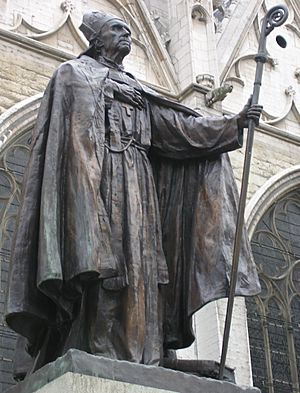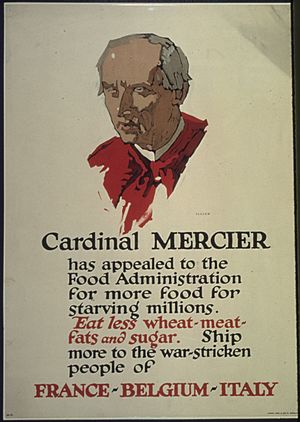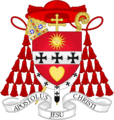Désiré-Joseph Mercier facts for kids
Quick facts for kids His Eminence Désiré-Joseph Mercier |
|
|---|---|
| Cardinal Archbishop of Mechelen Primate of Belgium |
|
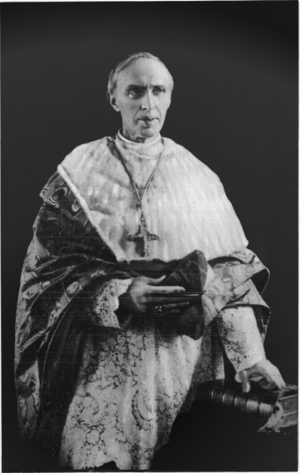 |
|
| Church | Roman Catholic Church |
| Archdiocese | Mechelen |
| See | Mechelen |
| Appointed | 21 February 1906 |
| Reign ended | 23 January 1926 |
| Predecessor | Pierre-Lambert Goosens |
| Successor | Jozef-Ernest van Roey |
| Other posts | Cardinal-Priest of San Pietro in Vincoli (1907-26) |
| Orders | |
| Ordination | 4 April 1874 |
| Consecration | 25 March 1906 by Antonio Vico |
| Created Cardinal | 15 April 1907 |
| Rank | Cardinal-Priest |
| Personal details | |
| Birth name | Désiré-Félicien-François-Joseph Mercier |
| Born | 21 November 1851 Braine-l'Alleud, Belgium |
| Died | 23 January 1926 (aged 74) Brussels, Belgium |
| Buried | Saint Rumbold's Cathedral |
| Parents | Paul-Léon Mercier Anne-Marie Barbe Croquet |
| Motto | Apostolus Jesu Christi ("Apostle of Jesus Christ") |
| Coat of arms |  |
Désiré Félicien François Joseph Mercier (1851–1926) was an important Cardinal from Belgium. He was also a well-known scholar, meaning he studied and learned a lot. He was especially good at a type of philosophy called Thomism. Many of his writings were translated into different languages.
One of his famous books was Les origines de la psychologie contemporaine (1897). Because of his great knowledge, the Pope noticed him. He became the Archbishop of Mechelen in 1906 and then a Cardinal in 1907. He served as Archbishop until he passed away.
Cardinal Mercier is remembered for bravely standing up against the German occupation of Belgium during World War I (1914–1918). He encouraged people to stay strong and hopeful.
Contents
About Désiré Mercier
His Early Life and Studies
Désiré Mercier was born in a place called Braine-l'Alleud in Belgium. He was the fifth of seven children. His parents, Paul-Léon Mercier and Anne-Marie Barbe Croquet, owned small businesses. Three of his sisters became nuns, and his brother Léon became a doctor.
One of his uncles, Adrien Croquet, became a missionary in Oregon, USA, in the 1860s. Later, in the 1870s, Désiré's cousin, Joseph Mercier, joined their uncle. Joseph married a woman from a Native American tribe there. Today, many people in that tribe are descendants of Joseph and his wife.
Désiré studied at a college in Malines from 1863 to 1868. He then went to a special school called a seminary in Mechelen to prepare for church service. He studied there from 1868 to 1873.
He became a priest on April 4, 1874. After that, he continued his studies. He earned degrees in theology and philosophy from the University of Louvain.
Becoming a Scholar
In 1877, Mercier returned to Malines and taught philosophy. Soon, he became a spiritual guide for students. He knew a lot about the ideas of Thomas Aquinas, a famous philosopher. Because of this, he was given a special teaching job at Louvain's Catholic university in 1882. He taught there until 1905.
During this time, he became good friends with Dom Columba Marmion, another scholar. In 1899, Mercier started the Higher Institute of Philosophy at Louvain University. This institute became a leading place for studying a new form of Thomist philosophy.
From 1894 to 1906, he also edited a magazine called Revue Néoscholastique. He wrote many articles about philosophy and psychology. His writings were translated into many languages, including English and German. His most important book was Les origines de la psychologie contemporaine (1897).
Becoming a Bishop and Cardinal
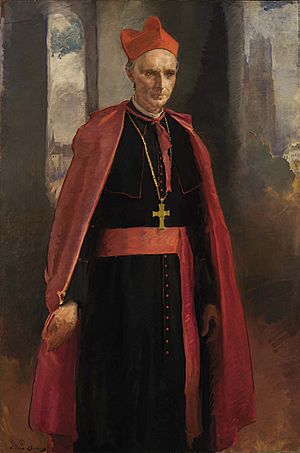
His excellent reputation caught the attention of Pope Pius X. On February 7, 1906, Mercier was chosen to be the Archbishop of Mechelen and the main leader of the Church in Belgium. He officially became a bishop on March 25, 1906. His motto was Apostolus Jesu Christi, meaning "Apostle of Jesus Christ".
Then, on April 15, 1907, Pope Pius X made him a Cardinal. This is a very high rank in the Roman Catholic Church.
Mercier was open to new ideas and tried to see how old philosophies could fit with new scientific discoveries. He even protected some scholars from being wrongly accused of having "modernist" ideas.
He was also interested in bringing different Christian groups closer together. From 1921 to 1926, he had special talks with Anglican leaders. He believed that Anglicans and Catholics should be "united, not absorbed."
Pope Benedict XV greatly supported Mercier during his time. He even told him, "You saved the Church!" Mercier also helped choose the next Pope, Pope Pius XI, in 1922.
Standing Strong During World War I
In 1914, the German army invaded neutral Belgium to attack France. Mercier was away at the time, attending the funeral of Pope Pius X and helping to elect a new Pope.
When he returned, he found his own cathedral in Mechelen partly destroyed.
At Christmas in 1914, Mercier wrote a strong letter called Patriotism and Endurance. This letter became a symbol of Belgian resistance against the German occupation. The Germans had stopped mail service, so the letter had to be delivered by hand. Mercier's powerful words encouraged the suffering Belgian people. He was even put under house arrest by the Germans, and many priests who read his letter were arrested too.
After the war, Mercier helped raise money to rebuild the library of the University of Leuven. The original library had been burned by the Germans. He traveled to New York City to help with this effort.
His Final Years
Cardinal Mercier had stomach problems for a long time. In January 1926, he had surgery for it. Even during the surgery, while under anesthesia, he talked with his surgeon.
In his last days, he was visited by King Albert and Queen Elisabeth of Belgium. He passed away on January 23, 1926, at the age of 74. He was buried in St. Rumbolds Cathedral.
Views and Beliefs
Church and Science
Mercier recognized the amazing talent of Georges Lemaître, who was a young student preparing for the priesthood. Mercier encouraged Lemaître to study Einstein's theories of relativity. Lemaître later became an expert in these theories and used them to propose that the universe is expanding.
Lemaître, along with other researchers, developed the "primeval atom" idea. This idea, combined with the work of other scientists, led to the well-known Big Bang theory of how the universe began.
Honors
Cardinal Mercier received many honors for his work and bravery, including:
- Grand Cross in the Order of Leopold (Belgium)
- Grand Cross in the Order of Malta
- Legion of Honour (France)
- Imperial Order of the Rising Sun (Japan)
- Order of the White Eagle (Poland)
- Order of Isabella the Catholic (Spain)
Images for kids
See also
 In Spanish: Désiré Félicien-François-Joseph Mercier para niños
In Spanish: Désiré Félicien-François-Joseph Mercier para niños
 | Toni Morrison |
 | Barack Obama |
 | Martin Luther King Jr. |
 | Ralph Bunche |


